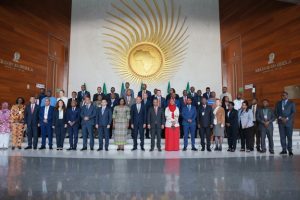
The financial sector has expanded considerably to develop an inclusive and modern financial sector in an effort to boosting digital program, according to International Telecommunication Union.
There is some improvement in financial inclusion and basic public services in Ethiopia. For example, utility service providers are not adequately linked to the financial sector. While cross-sectoral synergies play an essential role in driving financial inclusion and economic development, this still remains largely unexplored in Ethiopia as the provision of mobile money services has been limited to financial institutions such as banks and microfinance companies.
Telecommunication firms were allowed to engage in mobile money services only recently. Enabling cross-sector partnerships to include other sectors for example, utility service providers, schools and health centers to support the development of the financial sector would not only facilitate flexibility and foster effective service delivery, but would also establish a strong digital financial ecosystem to accelerate financial inclusion and socio-economic development.
International Telecommunication Union facilitates digital financial inclusion in Ethiopia highlight the low usage of digital financial services and limited number of digital finance platforms. The need for enhanced digital connectivity and capacity development are also emphasized as a foundational element to digital transformation and, consequently, to digital financial inclusion. Reliable and robust digital connectivity is crucial, as other digital products and services are dependent on seamless and equitable access to the Internet for their operation.
At the same time, the National Financial Inclusion Strategy and the Proclamations on Mobile and Agency banking put in place by the National Bank of Ethiopia support an enabling environment for digital financial services. In addition, the present national Digital Transformation Strategy comprises the recent positive developments and the liberalization of Ethio Telecom, accompanied by the reform measures taken by the Government.
Despite the progress, restrictive finance sector policy and lack of an up-to-date digital financial inclusion strategy that targets disadvantaged segments of the population are still a challenge. Restrictions on transaction values in the existing laws, the silos style of coordination, and the lack of appropriate frameworks for e-governance, consumer protection and cyber security are among the gaps in the policy, regulatory and institutional arena. From the demand side, the unbanked in general are largely constrained by different factors which include the lack of targeted interventions to promote digital financial services among women and disadvantaged segments of the population, including youth.
Ethiopia should build on achievements made so far on digital financial inclusion while redressing the gaps in the digital financial services landscape or ecosystem at all levels as well as adopt international policy frameworks that advocate the prioritization of women. This should be reflected in policy and programmatic responses, including efforts to support women’s financial resilience as they recover from the impact of COVID-19 and the associated economic challenges. It should strengthen policy, laws and institutions for digital financial services to support efforts to overcome barriers embedded in laws, regulations and institutional norms and enhancing access to digital financial services and mobile money accounts. And it should enable inclusive, interoperable digital financial payment services to help build a trustworthy, robust digital financial system and promote cross-cutting capacity development for inclusive digital financial services through a holistic approach to building the capacity of digital financial services actors at all levels.
Not only Ethiopia but also the rest of other African countries have worked on digitalization programs. The Africa region has seen continued growth in most areas of ICT infrastructure, access and use. Yet many challenges persist that have been magnified by the COVID-19 pandemic. Lack of meaningful and affordable connectivity is the key impediment to rapid progress. Mobile network coverage stands at 88.4 per cent, with 3G network coverage at 77.4 per cent and 4G network coverage at only 44.3 per cent.
Internet use by individuals is still below 30 per cent, Internet access at home stands at 14.3 per cent and only 7.7 per cent of households had access to a computer at home. This shows that there is a significant use gap, where individuals who live within the footprint of a network are not using the Internet because of lack of affordability, skills or meaningful/quality access. Internet access using mobile broadband totalled 33.1 per cent and use of fixed broadband remains very low. The highest percentage of Internet use was among the 15- to 24-year-olds at 39.6 per cent.
One of the key issues to be addressed is affordability. Only one country, namely Mauritius, meets the UN Broadband Commission target of 2 per cent of GNI per capita for both mobile and fixed broadband, with Gabon and the Seychelles each meeting the target for either, mobile or fixed broadband. The digital divide persists, with rural Internet access by household at 6.3 per cent at the end of 2019 compared with 28 per cent of urban households and a widening gender gap compared to the previous year, with a 16.9 percentage-point difference between women’s and men’s Internet use.
This highlights the need for more targeted initiatives to bring women online. Data on achieved levels of basic, standard and advanced ICT skills are very limited. Data from selected countries show that a significant skills gap exists in the Africa region across all skills categories, with great variation among the selected countries. However, many countries do not collect data on ICT skills. Increased efforts in data collection are key to addressing the skills gap going forward. In the area of cyber security, some progress has been made in the legal pillar, with most African countries having put in place cybercriminal legislation and cyber security regulation.
In terms of Information Communication Technology infrastructure development and integrated technologies such as AI, IoT and cloud computing, there is still ample room for development, which hinges on progress with regard to Internet adoption through infrastructure, demand-driven expansion and key reforms in the areas of data collection and data privacy, infrastructure, education and governance. A home grown AI community is on the rise and has attracted international attention and investment. Some successful AI deployments at scale are taking place in the areas of financial services, agriculture and health care.
The COVID-19 pandemic has had a profound impact on Africa and has pushed consumers and businesses alike, as well as governments to adopt digital services and technologies, where digital access was available, accelerating digital transformation and changing the mindset on advanced network technologies such as 5G. The COVID-19 pandemic has brought a surge in demand and network congestion on both mobile and fixed networks, as people have shifted to work from home and access more entertainment and education resources online, highlighting areas that require increased attention.
BY MEHARI BEYENE
The Ethiopian Herald May 14/2021



